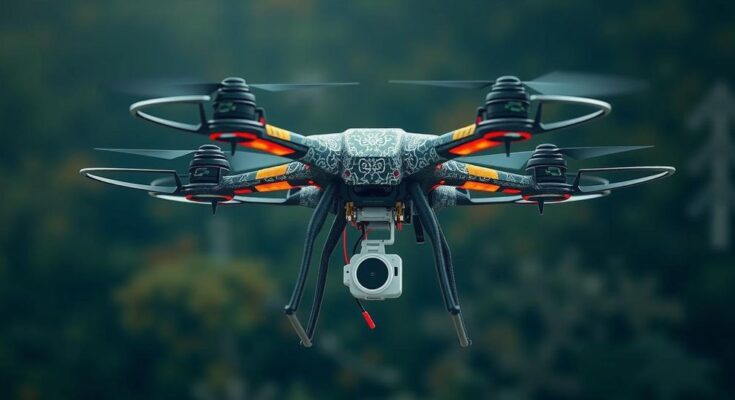The Combat Climate Change (C-3) UAV Project, a collaboration between Sweden and Colombia, aims to enhance climate monitoring through an advanced unmanned aerial vehicle (UAV) equipped with sensors to collect data on greenhouse gas emissions and ecosystem health. This initiative underscores the nations’ commitment to technological innovation and climate research, with support from Saab, EAFIT University, and KTH Royal Institute of Technology. It seeks to integrate aerial data with existing satellite information to improve climate prediction and management models.
In a significant development aimed at combating climate change, the collaboration between Sweden and Colombia has given rise to the Combat Climate Change (C-3) UAV Project. This initiative, introduced by Romina Pourmokhtari, the Swedish Minister for Climate and the Environment, and Yesenia Olaya, the Colombian Minister of Science, alongside key contributors such as Saab, EAFIT University, and KTH Royal Institute of Technology, focuses on utilizing unmanned aerial vehicles (UAVs) for vital climate data collection. The UAV will be equipped with specialized sensors designed to monitor greenhouse gas emissions, including carbon dioxide and methane, alongside other atmospheric pollutants. Additionally, it will facilitate assessments of ecosystems such as the Amazon rainforest and agricultural land, enabling researchers to detect changes in vegetation and soil conditions. This project forms part of a broader strategy to enhance climate understanding through a combination of aerial data and existing satellite information. Moreover, it aims to integrate this quantitative data into mathematical and AI modeling to better analyze global climate dynamics. Minister Olaya emphasized the importance of this initiative in addressing climate change in Colombia, stating that President Petro’s government prioritizes such efforts to monitor biodiversity and respond scientifically to climate challenges. Eva Axelsson from Saab highlighted the company’s commitment to innovation and safety in addressing climate issues, through collaboration in the project, which embodies the Triple Helix model of cooperation between academia, industry, and government. The project commenced in February 2023, with a team of engineers from KTH Royal Institute of Technology and EAFIT University collaborating on UAV development. Saab serves as an advisor, aiming to foster international academic cooperation and align scientific and societal interests with market needs.
Climate change remains one of the most pressing challenges of our time, necessitating cooperation at international levels to develop effective solutions. The Combat Climate Change (C-3) UAV Project reflects this need for collaboration between nations. The partnership not only showcases technological innovation but also highlights the significance of collecting precise environmental data to inform strategic governance on climate-related issues. This initiative fits into a broader narrative of increasing global awareness surrounding climate vulnerabilities, especially in ecologically sensitive areas like the Amazon rainforest, which plays a crucial role in global carbon cycles and biodiversity.
In conclusion, the Combat Climate Change (C-3) UAV Project represents a critical step forward in climate monitoring efforts through international collaboration between Sweden and Colombia. By leveraging advanced UAV technologies for data collection and analysis, the project aims to contribute to the understanding and management of the global climate system. The initiative underscores the importance of innovation, cooperation, and commitment to environmental protection in addressing the multifaceted challenges posed by climate change.
Original Source: www.saab.com




